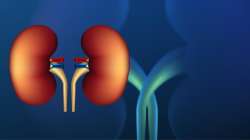High Blood Pressure, back pain and others warning signs that your kidneys are in trouble
Kidneys are vital organs that play a critical role in maintaining overall health. Here are the common symptoms of kidney trouble, including changes in urine, swelling, fatigue, weakness, nausea, vomiting, high blood pressure, and back pain.

Kidneys are essential organs responsible for filtering blood and removing waste from the body. They also play an important role in producing hormones and regulating blood pressure. When the kidneys are not functioning correctly, it can lead to serious health problems. Early detection of kidney disease can help prevent further damage and improve overall health. Being aware of the warning signs of kidney trouble and taking proactive steps to prevent damage can help ensure the health and longevity of these essential organs.
Here are some warning signs that indicate your kidneys may be in trouble.
Changes in Urine: One of the most common signs of kidney trouble is a change in urine colour, frequency, and odour. This can include dark or cloudy urine, foamy urine, or frequent urination.
Swelling: When the kidneys are not functioning correctly, excess fluid can accumulate in the body, leading to swelling in the feet, ankles, and legs. This can also cause puffiness around the eyes and shortness of breath.
Fatigue and Weakness: Chronic kidney disease can cause fatigue and weakness due to anaemia, a condition where the body lacks enough red blood cells to carry oxygen to the body's tissues.
Nausea and Vomiting: Kidney damage can cause a buildup of toxins in the body, leading to nausea and vomiting. This can also cause a loss of appetite and weight loss.
High Blood Pressure: The kidneys play a critical role in regulating blood pressure. When they are not functioning correctly, it can lead to high blood pressure, which can increase the risk of heart disease, stroke, and kidney failure.
Back Pain: Kidney problems can cause pain in the lower back, sides, or abdomen. This can be a signal of kidney stones.
Common causes of kidney disease
The most common causes of kidney disease are diabetes, high blood pressure, and kidney infections. Other factors such as obesity, smoking, and a family history of kidney disease can also increase the risk.
How is kidney disease diagnosed?
Kidney disease is diagnosed through a series of tests, including blood and urine tests, imaging tests such as an ultrasound or CT scan, and a kidney biopsy in some cases.